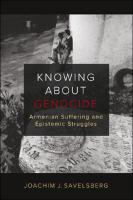Knowing about Genocide
Armenian Suffering and Epistemic Struggles
Author(s)
Savelsberg, Joachim J.
Collection
Knowledge Unlatched (KU); Toward an Open Monograph Ecosystem (TOME)Language
EnglishAbstract
This book is freely available in an open access edition thanks to TOME (Toward an Open Monograph Ecosystem)—a collaboration of the Association of American Universities, the Association of University Presses, and the Association of Research Libraries—and the generous support of the University of Minnesota. Learn more at the TOME website, available at openmonographs.org.
How do victims and perpetrators generate conflicting knowledge about genocide? Using a sociology of knowledge approach, Savelsberg answers this question for the Armenian genocide committed in the context of the First World War. Focusing on Armenians and Turks, he examines strategies of silencing, denial, and acknowledgment in everyday interaction, public rituals, law, and politics. Drawing on interviews, ethnographic accounts, documents, and eyewitness testimony, Savelsberg illuminates the social processes that drive dueling versions of history. He reveals counterproductive consequences of denial in an age of human rights hegemony, with implications for populist disinformation campaigns against overwhelming evidence.
Keywords
History; Middle East; Turkey & Ottoman Empire; Political Science; Genocide & War Crimes; Sociology; Sociology of Knowledge and Collective MemoryDOI
https://doi.org/10.1525/luminos.99ISBN
9780520380196Publisher
University of California PressPublisher website
https://www.ucpress.edu/Publication date and place
2021Grantor
Imprint
University of California PressClassification
Middle Eastern history
War crimes
Sociology


 Download
Download Download
Download